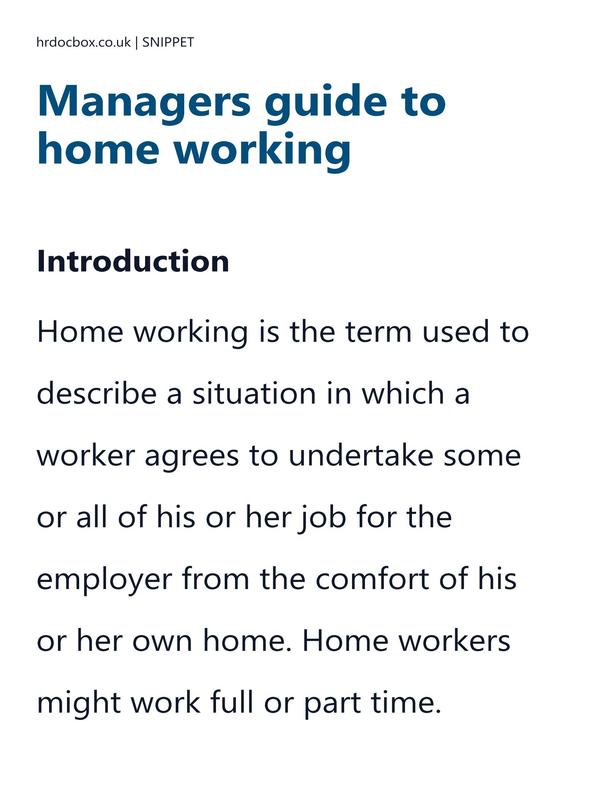Managers guide to home working


This guide looks at the legislation and best practises for home working, covering the statutory right of qualified workers to request to work from home and how line managers may effectively address the practical challenges that come with it.
- Includes 12 months' access to the Managers guide to home working, with all updates provided free of charge and notified to you.
- UK-specific accuracy.
- 2,980 words over 7 pages.
- Last updated 08/03/2025.
- Format: Word / PDF / plain text / email.
- Delivery: Instant download after purchase (no physical item).
- Access: Download link shown here after checkout.
- This Managers guide to home working will SAVE you up to 3 hours research, save you money, and reduce your risk.
Managers guide to home working
Introduction
Home working is the term used to describe a situation in which a worker agrees to undertake some or all of his or her job for the employer from the comfort of his or her own home. Home workers might work full or part time.
Although home working arrangements and management of home employees are not without obstacles, they can give benefits to an organisation. An arrangement in which an employee conducts some or all of his or her job from home can, nevertheless, be very productive with careful thinking and preparation, as well as regular good communication.
Why should homework be permitted?
Working from home can provide a variety of major benefits, but they must be objectively assessed against the possible drawbacks. Working from home is not for everyone, and not all occupations are ideal for doing so.
Advantages and disadvantages of home working
Advantages
- Because of the reduction in the requirement for office space and other overheads, the organisation will be able to save money.
- When it comes to recruitment, the manager may be able to cast a broader net because it doesn't matter where the employee resides as long as he or she has access to a computer and a phone.
- Individuals who cannot stay away from their homes for extended periods of time will be included in a larger pool of talent.
- Time that would have previously been spent travelling to work may now be used for productive work.
- Home employees are likely to be motivated and so productive since they have control over how and when they execute their work.
- Home employees are less likely to be interrupted by colleagues than office workers.
- The presence of a personal problem does not always necessitate the employee's absence from work, hence absence levels
This is a 10% preview of the Managers guide to home working. For instant full access, purchase this item or a parent bundle.
Managers guide to home working purpose
This Managers guide to home working aims to offer you a versatile and customisable tool, serving as a solid foundation for your needs. Utilise it to ensure consistency, enhance accuracy, and save valuable time.
Adapt it to suit your unique requirements, ensuring efficiency and effectiveness in your HR processes.
Frequently Asked Questions about a Managers guide to home working
Frequently Asked Questions about a Managers guide to home working
-
Can I use the Managers guide to home working in my small business?
Yes. The Managers guide to home working is designed to be flexible and suitable for organisations of all sizes, including small businesses and charities. It follows UK employment law best practice, so even if you don't have an in-house HR team, you can confidently apply it.
-
Is the Managers guide to home working compliant with 2026 UK employment law?
Absolutely. Like the Managers guide to home working, all of our templates are drafted with the latest ACAS guidance and UK employment legislation in mind. We review and update them regularly, so you can be confident they remain compliant.
-
Can I customise the Managers guide to home working for my organisation?
Yes, we highlight the areas of the Managers guide to home working that you need to update with your own details, and where you need to make decisions to suit your situation. This saves you time and ensures that you meet best practice.
-
Do I get instant access to the Managers guide to home working?
Yes. Once purchased, you'll be able to download the Managers guide to home working instantly. Templates are provided in editable Word or Excel format so you can customise them easily, and in PDF format for easy sharing.
-
What if I need more help, not just a Managers guide to home working?
If you're looking for broader support, we also offer toolkits and library bundles that include the Managers guide to home working, along with other HR templates and policies for fully managing your situation. These may be more cost-effective if you need deeper advice.
-
Why should I use this Managers guide to home working, and not AI to generate it?
The risk of using a free AI-generated template 'without review' includes your legal exposure, missing context, and no awareness of the wider process, whereas purchasing the Managers guide to home working from us mitigates that risk.
